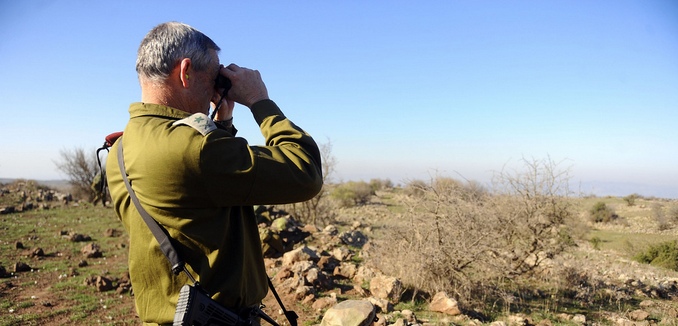A rocket launched from Syria struck the Israeli Golan Heights on Monday night, the Israeli military said. No injuries were reported.
Earlier today a projectile launched from Syria, hit the northern #Israeli Golan Heights. No injuries have been reported. #Syriaceasefire
— Peter Lerner (@LTCPeterLerner) September 12, 2016
On Saturday, the Israeli Air Force retaliated against Syrian army positions in the Golan after a rocket struck Israel’s side of the territory. That projectile, which caused no injuries, was the third to hit Israel from Syria in the past week.
While an IDF spokeswoman said on Saturday that the rocket was likely “spillover” from the fighting in Syria’s civil war, the IAF struck Syrian army artillery positions in order to enforce its zero-tolerance policy on errant fire from the Syrian conflict reaching Israel. The IDF holds the Syrian regime accountable for all rocket fire from its territory into Israel.
“The Syrian government [is] accountable for this blatant breach of Israeli sovereignty, the IDF will continue to act in order to safeguard Israel and its civilians,” the Israeli military said in a statement.
Iranian state media reported last week that the Iran-backed terrorist group Hezbollah is preparing to move troops into the southern Golan area bordering Israel. Hezbollah, together with Syrian army soldiers, are reportedly preparing to launch operations against rebel groups operating near Israel’s border.
In response to these reports, the IDF said that it “closely monitors all of Israel’s borders, including in the north, and remains prepared for any scenario.”
Last month, former Shin Bet chief and current chairman of the Knesset’s Foreign Affairs and Defense Committee Avi Dichter warned that any future war between Hezbollah and Israel will be much different because of the new capabilities that the Iranian proxy developed while fighting in Syria’s civil war. This assessment was echoed by Nadav Pollak of the Washington Institute for Near East Policy, who asserted last month that Hezbollah’s position within the so-called “resistance axis” of Israel’s enemies “has been strengthened” due to its participation in Syria’s civil war
According to a July report published by the Foundation for Defense of Democracies (FDD), Israeli officials believe that any future war with Hezbollah has the potential to cause “thousands of civilian deaths” in Israel. (This past February, Hezbollah threatened to attack ammonium tanks in Haifa, which could kill tens of thousands of people.)
Jonathan Schanzer, vice president of research for FDD, explained that Hezbollah’s widely-reported tactic of hiding military assets in civilian areas may also lead to mass casualties. Reports emerged two years ago that Hezbollah was offering reduced-price housing to Shi’ite families who allowed the terrorist group to store rocket launchers in their homes. An Israeli defense official told The New York Times in May 2015 that the buildup of Hezbollah’s terror infrastructure in southern Lebanese villages meant that “civilians are living in a military compound” and that their lives were at risk. A few days later, a newspaper linked to Hezbollah bolstered the Israeli assessment.
Sheikh Hassan Nasrallah, chief of Hezbollah, boasted in June that all of “its weapons and rockets” come from Iran. Nasrallah’s speech seems to confirm an assurance given to him last August by Iranian Foreign Minister Mohammad Javad Zarif that the nuclear deal presented “a historic opportunity” to confront Israel. Iran recently announced that its military spending would increase by 90% in the coming year.
Nasrallah’s comments also call into question assurances made by Secretary of State John Kerry that the U.S. would ensure that Iran could not arm Hezbollah, despite the lifting of nuclear sanctions against Tehran. “Our primary embargo is still in place,” Kerry said at a Senate hearing last year. “We are still sanctioning them. And, I might add, for those things that we may want to deal with because of their behavior, for instance, Hezbollah, there is a UN resolution, 1701, the prevents the transfer of any weapons to Hezbollah. That will continue and what we need to do is make sure that we’re enforcing it.”
While UN Security Council Resolution 1701, which was passed unanimously to end the 2006 war, forbids the arming of Hezbollah, Iran has continued to send the terrorist group weapons and the Security Council has refused to enforce it.
[Photo: Israel Defense Forces / Flickr ]




